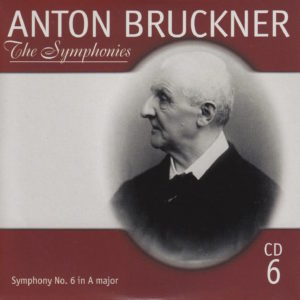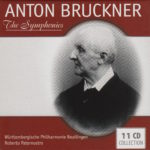Happy New Year!
 This morning’s conductor of Anton Bruckner’s Symphony No. 6 in A Major (WAB 106) is Vienna-born Roberto Paternostro (1957?-), another person about whom I knew nothing and of whom I had never heard until I started this project.
This morning’s conductor of Anton Bruckner’s Symphony No. 6 in A Major (WAB 106) is Vienna-born Roberto Paternostro (1957?-), another person about whom I knew nothing and of whom I had never heard until I started this project.
And, truth be told, I still know very little about him since there’s scant information about him online.
This is the conductor about whom I wrote needed a publicist. He’ll never reach Karajan status if people don’t know who he is. (Well, if he doesn’t have Karajan’s talent he won’t, either. But allowing the public to see who he is and to know more about him would give him a leg up – especially in this box set, which includes zero information about him.)
I first encountered the mysterious Mr. Paternostro on Day 11, Symphony No. 1.
Then again on Day 27, Symphony No. 2.
 And again on Day 43, Symphony No. 3.
And again on Day 43, Symphony No. 3.
And again on Day 59, Symphony NO. 4.
Finally, most recently, on Day 75, Symphony No. 5.
If you want to know what I thought of those previous symphonies, take a peek. Otherwise, here are the facts about today’s recording:
 Bruckner’s Symphony No. 6 in A Major (WAB 106) composed 1879-1881
Bruckner’s Symphony No. 6 in A Major (WAB 106) composed 1879-1881
Roberto Paternostro conducts
Paternostro used the ??? version. Which year? Which editor? Unknown.
Wurttembergische Philharmonie Reutlingen plays
The symphony clocks in at 61:22
This was recorded live at Basilika Weingarten, Germany, on July 5, 2003
Paternostro was 46 when he conducted it
Bruckner was 57 when he finished composing it
This recording was released on the SWR/Membran label
Bruckner wrote his symphonies in four parts. The time breakdown of this one (Symphony No. 6 in A Major, version unknown, from this particular conductor (Paternostro) and this particular orchestra (Wurttembergische Philharmonie Reutlingen) is as follows:
I: Majestoso…………………………………………………………………………………………………….16:42
II: Adagio. Sehr feierlich (Very solemnly)……………………………………………………….19:16
III: Scherzo. Nicht schnell (Not fast) — Trio. Langsam (Slowly)………………………8:43
IV: Finale. Bewegt, doch nicht zu schnell (With motion, but not too fast)……16:44
Total running time: 61:22
And now for my subjective assessment:
My Rating:
Recording quality: 4
Overall musicianship: 4
CD liner notes: 0 (totally unacceptable)
How does this make me feel: 4
Paternostro and Wurttembergische Philharmonie Reutlingen did a fine job with this symphony, with the main quibble that the Adagio (Movement II) is played a bit too “very solemnly,” which lengthens it by a considerable amount.
In fact, Paternostro’s Adagio is the longest of any conductor of Bruckner’s Sixth I’ve heard so far.
Paternostro – 19:16
Masur – 15:00
Maazel – 17:59
Karajan – 18:58
Jochum (green box) – 18:36
Jochum (white box) – 17:14
Haitink (Haitink box) – 17:25
Gielen – 16:03
Haitink (Bruckner Collection box) – 17:19
Chailly – 16:44
Barenboim – 18:13
As you can see, Paternostro’s Adagio is 4:16 longer than the shortest Adagio (Masur), and :18 seconds longer than the longest (Karajan).
The entire Paternostro performance clocks in at the second longest time of Bruckner’s Sixth, with Maazel’s – the longest – just :06 longer.
I tend to prefer a shorter performance, truth be told. I want a conductor to get it, get out, and leave me wanting more – not make me wonder why he dragged it out so long.
The highlights of Paternostro’s performance are – not surprisingly – Movement I, Movement III, and Movement IV. Especially Movement III, which is one of my favorites of any Bruckner symphony to date.
This is a nice recording. The brass is not piercing or brassy. The space between the instruments is adequate to give my mind a place to rest to appreciate what I’m hearing.
I just wish this music label cared enough about the conductor and the orchestra to include a booklet/liner notes in the box.
Oh, one more thing, there’s a full two minutes of applause at the end of the Finale. Seriously, it starts hesitantly at 14:43 and continues to the end at 16:44. (And, yes, I realize this accounts for two minutes more on the running time. But are people really going to cut off the CD at the start of the applause? No. They’ll let it play, making the applause part of the listening experience.)
The applause doesn’t feel organic, however. Not a lot of cheers and “Huzzahs!” in the audience. Just continuous applause that, honestly, doesn’t seem warranted.
But who am I to say?
To each his own.
